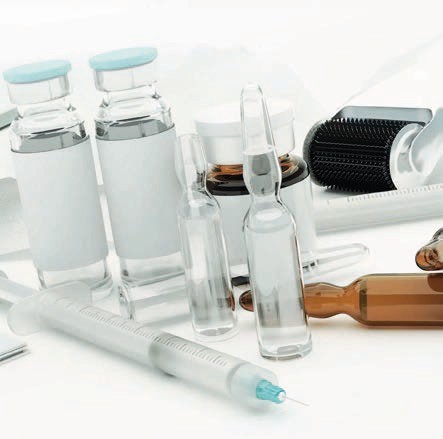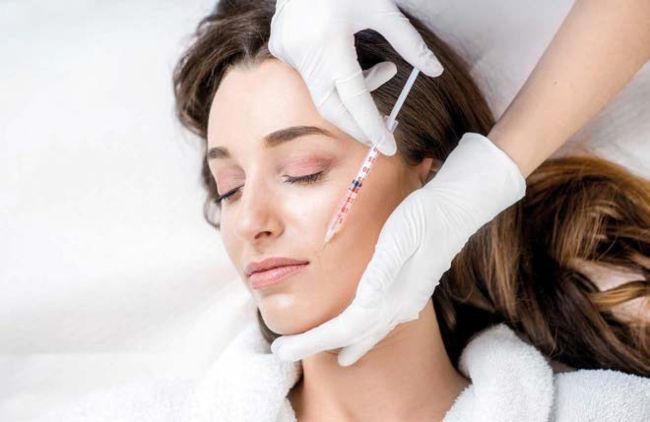Talking to…Professor David Sines
Following the announcement that the JCCP is dropping beauty therapists from its registers for injectables, Eve Oxberry talks to the group’s chair about the future of the advanced treatments market
Interview
The debate around who should carry out advanced aesthetic procedures such as injectables has divided the industry for years. So, when Professor David Sines announced in August that beauty therapists would be cut from the Joint Council for Cosmetic Practitioners (JCCP) registers for injectables, it was met with surprise by the wider market, not least because the registers only launched in March this year.
At that time, there was one register for medics, and a second for non-medics, who otherwise have no regulatory body. The second required that, to inject fillers, therapists would need to pass a Level 7 qualification, equivalent to a postgraduate degree, and be overseen by a medic.
Following publication of these criteria, the JCCP faced a lot of criticism from medic-led groups, such as Save Face and Keep Medical Aesthetics Medical, who are very vocal in their arguments that beauty therapists should not be allowed to inject. “There was significant pushback that caused all kinds of social media activity”, says Sines.
“Having listened to a host of negative feedback about ‘why would healthcare professionals join a register that provided equal status to nonhealthcare professionals?’, I took that information back to my board of trustees to consider.”
He does acknowledge, “Some were being deliberately obstructive and are pursuing selfinterest”, but adds, “We’ve been criticised, and I think correctly, for saying beauty therapists are a profession in their own right, whereas to be a profession you need to be able to demonstrate you have a code of practice, you’re governed, you’ve got principles and you’ve got a body of learning and knowledge that’s accepted.”


However, Sines recognises that the development of such a mandatory governing body seems unlikely, causing somewhat of a catch 22 situation. “Would the Government really want to take on the challenge of regulating a commercial industry that could lose money to the exchequer and also cause employment challenges on the high street?”, he questions. “I don’t want to be accused of that but I do think we should have a statutory structure, which at least could say that if you have your own salon, the premises you operate from need to be legally registered and inspected and there will be a legal requirement that you have to have a registered, named healthcare practitioner for your practice if you wish to perform treatments at a certain level.”
Government review
Sines’s work in this area began back in 2013, after the Government’s Keogh Review recommended an overhaul of the qualifications needed to perform non-surgical cosmetic treatments, particularly injectables. Sines was then chair of Health Education England (HEE) and developed a framework, finalised in 2016, which recommends a Level 4 qualification to perform treatments such as laser hair removal and superficial peels, and Level 7 for injectables, plus a range of recommendations in between.
Following that, the Cosmetic Practice Standards Authority (CPSA) and the JCCP were formed as Government-approved not-for-profit organisations to develop standards and maintain a register of practitioners.
“When we started all of our considerations way back in 2013, we were actually mandated by the Department of Health to be inclusive of beauty therapists”, says Sines. “What we have discovered as we’ve moved through with that inclusive register is there are no existing suitable training courses for Level 7 injectables for non-healthcare professionals, so that prevents anyone from joining the register. Secondly, we’ve learned that the Department of Health and Social Care are reviewing their decision and want to commence further dialogue on regulation.”
“I’ve never argued that anything less than statutory regulation will meet the needs of our patient group”
In fact, the Government brought a new team together in May to consider the issues of cosmetic regulation.
The JCCP said the decision to prevent therapists injecting will be reviewed in three years. Sines adds, “We’re not closing for good but for three years because we want time to have active dialogue – I’m looking to have a meeting with the Department of Health and Social Care in mid- Autumn and we’ve said we still want people to continue to develop training pathways.”
No path for therapists
Some beauty therapists have argued that, as there were no Level 7 qualifications for non-healthcare professionals when the registers launched, they were never inclusive from the start.
“We put the registers out there and waited for individuals to come forward but we didn’t have a single non-healthcare professional enquiring about registration at Level 6 or 7”, argues Sines. “I think beauty therapists who looked at the standards have recognised they’re not in a position to be able to apply because they don’t possess the requisite training.”
So far, there is just one Level 7 course (available at multiple centres) that is approved by The Office of Qualifications and Examinations Regulation (Ofqual – which regulates in England) and its equivalents elsewhere in the UK. The course, accredited by IQ, is for healthcare professionals only. It’s been running at three test sites and the results have been used by the JCCP to adjust the HEE framework, which it has just formally taken over. As PB went to press, the updated framework, incorporating the CPSA practice standards, was due to be published in late August.

Sines says IQ did approach the JCCP last year about developing a qualification for non-healthcare providers to train from Level 5 up to Level 7, but proposed to approach the United Kingdom Accredited Standards Authority (UKAS) to approve it. “UKAS have educational kite marks for individuals rather than courses”, says Sines. “Every year, you have to reapply…We’re yet to decide if UKAS could provide us with the same level of security for education as Ofqual does.”
Regulation without enforcement
The important point to remember in all of this is that currenlty the JCCP registers are not mandatory, leading many to complain that, while responsible practitioners may pay the £450 fee to join them, the irresponsible ones will carry on practising dangerously with no legal recourse.
“I’ve never argued that anything less than statutory regulation will meet the needs of our patient group. I think it’s a real possibility in the future and have always argued that the JCCP should be a means to an end”, says Sines.
However, he accepts that as long as its registers are not mandated into law, the JCCP faces a major challenge in terms of raising awareness, and plans to tackle this by instilling a sense of accountability among three key groups: consumers, insurers and product suppliers.
With any industry standard, consumer recognition is the best route to success, yet often the hardest and most expensive to achieve. To get the ball rolling, the JCCP has just put in a bid to a charitable organisation for funding to launch a major consumer campaign within the next six months. “That is the central link; the public recognising there is a real need to ask questions of their practitioner regarding their training”, says Sines. If the funding comes through, he will work with key consumer interest groups, influencers and media outlets, to get the message out.
Meanwhile, the JCCP is about to launch an additional register for training providers. “To get on to that you’ll have to pay a fee and subject yourself and your training organisation to a very rigorous face-to-face audit”, says Sines.
While major changes may be underway, the story is far from over. Beauty therapists will continue to fight for acceptance on the register of injectables, while Sines pushes for greater powers for the JCCP. “We should be able to see the JCCP’s work having been completed when statutory regulation comes in and we morph into a statutory regulator”, he says.
KEY DATES
2012
The Department of Health launches a review into cosmetic procedures, following the scandal around dangerous breast implants
2013
The final report of the Keogh review is published, recommending standardised and regulated qualifications for injectables
2014
The Government formally responds to the Keogh review, saying providers of aesthetic treatments must “raise their game or face the consequences”
2016
HEE develops a training framework for aesthetic treatments. The CPSA and JCCP then form to create and implement aesthetic training and standards
March 2018
The JCCP’s two practitioner registers go live, with options for both medics and non-medics (under supervision)
August 2018
The JCCP removes beauty therapists from its registers at Level 7 for injectables